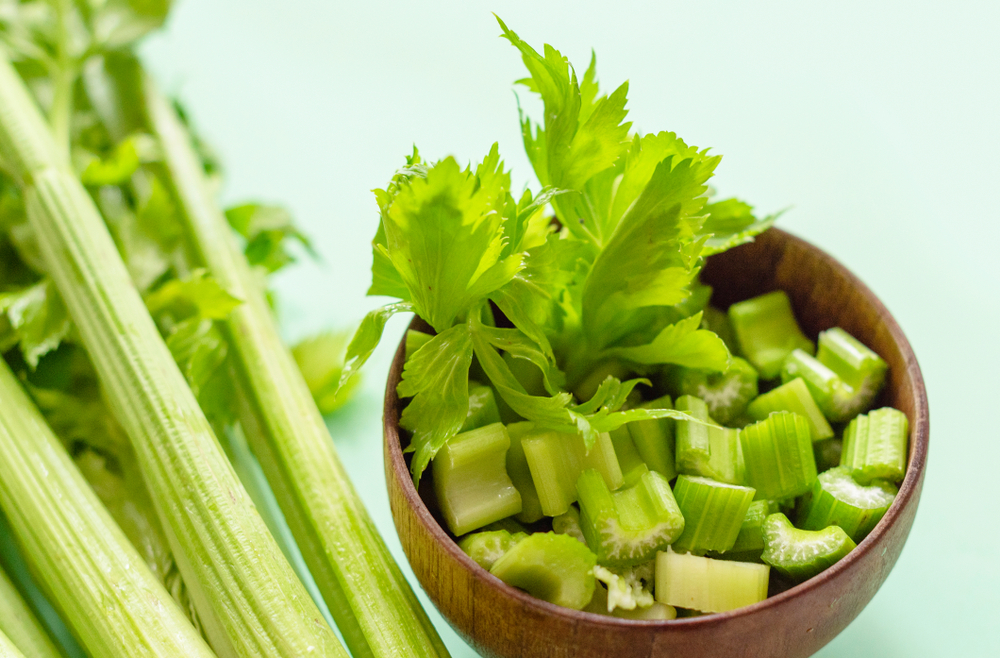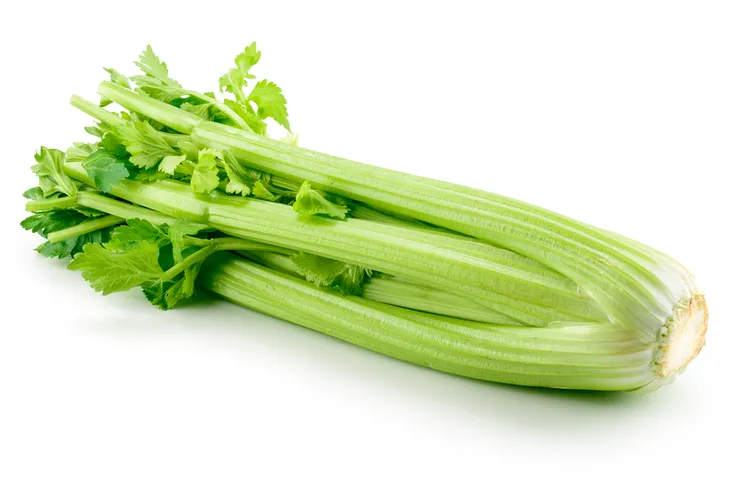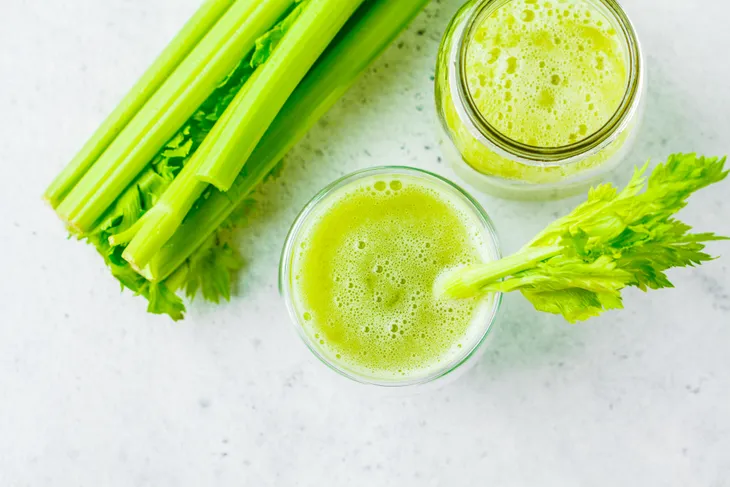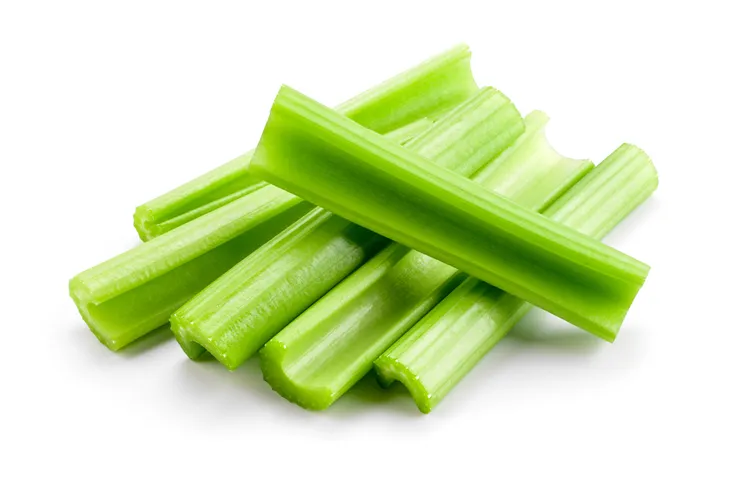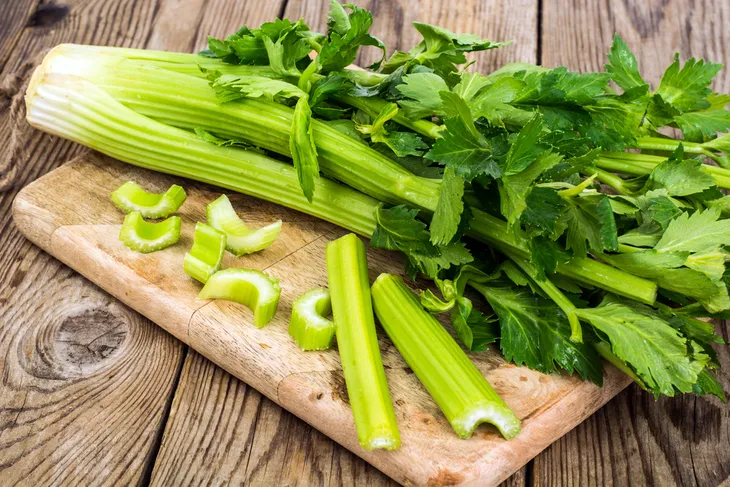Celery – it’s sometimes the co-star on a plate of chicken wings while watching the big game, but in fact celery should have a pedestal all its own. Not only is celery a light and refreshing snack, it also packs a lot of nutrition. There are a number of other health boosts from enjoying some celery, and some of them may surprise you.
1. Controls Cholesterol
If you’re dealing with high cholesterol, then celery may be something you want to have more of, says Dr Axe. The source says celery contains a “unique compound” called 3-n-butylphthalide (BuPh) that reportedly has lipid-lowering powers (cholesterol is a lipid).
It cites a study by the University of Singapore involving rats that were fed a high-fat diet for 8-weeks. The rats that were given celery extract “showed significantly lower levels of lipids” in their blood than those that didn’t.
2. Soothes Inflammation
Celery is a nice, light snack to enjoy, and it can also apparently calm any inflammation through your body that has been linked to illnesses such as arthritis or osteoporosis, explains Healthline.
The source says celery and celery seeds have about 25 “anti-inflammatory compounds” that can protect against flare-ups in the body that can cause pain and other health issues.
Lowers Blood Pressure
According to an article form Cleveland Clinic, celery may be able to keep high blood pressure under control. While the initial craze was eating celery seeds for this purpose, the source says whole celery stalks are the way to go.
How does this work? The clinic says celery contains something called phthalides, which is called NBP as an extract and works to relax artery walls and increase blood flow (thus lowering pressure). However, when you eat the whole stalk, you also get the added benefit of fiber, magnesium and potassium that also help regulate blood pressure, it adds.
Calms Gastric Ulcers
The thought of stomach ulcers should be enough to make your stomach turn – they are painful sores in the stomach lining from different causes (such as bacteria). However, according to LiveStrong, celery might be an ally in reducing ulcer symptoms.
It says celery contains flavonoids, “which inhibit the growth of certain bacteria.” It cites an article from the Journal of Pharmacy and BioAllied Sciences that notes polyphenolic compounds (including flavonoids) “have been reported to have a beneficial role in the treatment of gastric ulcers.”
Protects Liver Health
Your liver is one of the hardest-working and most beneficial organs in your body, so keeping it healthy is essential to help filter out toxins from your system. Dr. Axe points to research from the Helwan University in Egypt that shows feeding rats celery led to a “reduction in the amount of dangerous fat buildup within the liver.”
We should also note these rats were given chicory and barley powder to achieve the positive results in enzyme function and lipid control. “The more celery, chicory and barley the rats were given, the more their liver health improved,” it adds.
Helps Prevent UTIs
If you’ve ever had a urinary tract infection (UTI), you probably don’t want to experience it again. Luckily, Chatelaine notes celery can help you achieve a UTI-free lifestyle thanks to its diuretic properties – “Celery helps you expel water from your body without also losing a lot of potassium.”
Celery apparently also contains something helpful called a L-3-N-Butylphthalide compound, which sources say helps lower blood pressure. The source warns to monitor your consumption of celery if you’re on blood pressure medication (due to the diuretic effect).
Helps Keep You Regular
Healthline notes that celery is about 95-percent water, which is never a bad thing when it comes to helping things move through your system. However, just as importantly, it contains “generous” amounts of soluble and insoluble dietary fiber, which help prevent constipation and diarrhea.
It backs up the earlier claim about stomach health benefits, noting a compound known as apiuman in celery can actually help prevent stomach ulcers. It apparently is also effective to help prevent bloating. Just 1-cup of celery has 5-grams of dietary fiber, which is a good portion of the 25-30-grams you should get daily.
Helps Control Weight
Stylecraze says boldly, “Celery is one of the few ideal foods you can consume for healthy weight loss.” Why? Not only is celery low in calories, it’s high in fiber, as we noted. Fiber can help you feel fuller for longer periods of time after eating, it adds.
Because you feel fuller, you may not have the craving for “binging” on foods that pack on pounds, “ultimately facilitating weight loss,” says the source. The hydrating properties of celery can also help prevent dehydration that saps energy levels needed to stay active, it suggests.
Fights Off Cancer?
It’s hard to believe that something as simple as celery could help ward off something as serious as cancer, but apparently there is some evidence to back that up. LiveStrong says celery contains both apigenin and luteolin, which are flavonoids that have been linked to destruction of pancreatic cancer cells.
It cites a study abstract published in Food and Chemical Toxicology that explored the impact of these flavonoids on the effectiveness of chemotherapeutic drugs in preventing the spread of cancer cells. “The study revealed that pretreatment of specific human pancreatic cancer cells with low concentrations of apigenin or luteolin effectively aided the chemotherapeutic drug effectiveness,” it adds.
Aids in Menopause Symptoms
Hydration levels are especially important during menopause, and celery is definitely an ally in keeping your fluid levels up. Menopause can also lead to “excess stress,” leading to cravings for sweet or salty food, says the source – which won’t help your overall health. Reach for celery instead (use a healthy dip if you want a bit more flavor).
